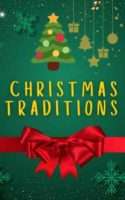“Maybe Christmas doesn’t come from a store… maybe Christmas means a little bit more.” – Dr Seuss
Christmas is almost here, and I’m sure some of you cannot wait. Christmas festivities bring along a lot of fun and cheerfulness, and we’re all here for that. Along with all the good food and fun times, have you ever stopped and thought of how Christmas came about; how and when it all started?
Christmas Origins
Christmas is celebrated on December 25th as both a religious holiday and a worldwide cultural event. Christians celebrate Christmas Day as the birth of Jesus.
According to Britannica, Christmas, which is “mass on Christ’s day”, is a fairly recent term that was created. “The earlier term Yule may have derived from the Germanic jōl or the Anglo-Saxon geōl, which referred to the feast of the winter solstice. The corresponding terms in other languages—Navidad in Spanish, Natale in Italian, Noël in French—all probably denote nativity (birth). The German word Weihnachten denotes ‘hallowed night.’”
In many parts of the world, the middle of winter is a time for celebration. Europeans have been celebrating in the heart of winter for centuries. History.com explains, “Many people rejoiced during the winter solstice, when the worst of the winter was behind them and they could look forward to longer days and extended hours of sunlight.”
Yule, is celebrated on December 21st in Scandinavia, which is the winter solstice all the way through into late January. In Germany, the pagan god Oden was honoured during the winter holiday.
In Rome, the winters were not nearly as bad as in the far north of Europe so the Romans celebrated Saturnalia, which was a holiday that honours the god of agriculture.
December 25th was also a time when the Romans celebrated Juvenalia, a feast honouring the children of Rome. Some Romans celebrated the birthday of Mithra, the god of the unconquerable sun. This also took place on December 25th.
History.com states, “It is commonly believed that the church chose this date (December 25th) in an effort to adopt and absorb the traditions of the pagan Saturnalia festival. First called the Feast of the Nativity, the custom spread to Egypt by 432 and to England by the end of the sixth century.”
Christmas Traditions
There are many traditions that happen during Christmas time.
Christmas traditions may include:
- Exchanging gifts
- Decorating Christmas trees
- Attending church
- Sharing meals with family and friends
- Buying new Christmas outfits
- Waiting for Santa Claus or Father Christmas to come through the chimney.
In South Africa, we do not focus largely on the idea of Santa Claus because our Christmas happens in Summer, and we all know Santa travels on his sleigh in winter. Furthermore, the concept of Santa Claus coming through the chimney doesn’t really coincide with our living conditions because very few homes may have a chimney.
Historian, Ronald Hutton, shared with LiveScience, “The Christmas tree is a 17th-century German invention, … but it clearly derives from the pagan practice of bringing greenery indoors to decorate in midwinter. The modern Santa Claus is a direct descendent of England’s Father Christmas, who was not originally a gift-giver. However, Father Christmas and his other European variations are modern incarnations of old pagan ideas about spirits who travelled the sky in midwinter…”
Final Word
Edna Ferber couldn’t have said it any better when she said, “Christmas isn’t a season. It’s a feeling.” I hope this Christmas is a happy, loving and festive time for you, your friends and your family. Stay safe, and be merry.
***
Tell us: What are some of your Christmas traditions?
Read more here on spending habits on Christmas day.

